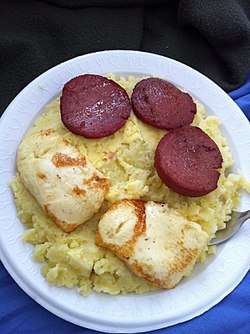Mangú
Mangú is a Dominican traditional dish[1] served for breakfast, lunch or dinner.
 | |
| Course | Breakfast, main course or side dish |
|---|---|
| Place of origin | Dominican Republic, Africa, Pan-Latin, Caribbean cuisine |
| Associated national cuisine | Dominican Republic cuisine |
| Serving temperature | Hot |
| Main ingredients | Green plantains |
| Ingredients generally used | red onion, queso frito, eggs, Dominican fried salami |
| Variations | Mofongo, Fufu, Tacacho, Cayeye |
Mangú is made up of boiled (either ripe or green) plantains or green bananas. The plantains are then mashed with butter, margarine or oil in the water in which they were boiled. The dish is topped with sautéed red onions that have been cooked with vinegar. Queso frito (fried cheese), fried Dominican salami, and fried eggs are often added as side dishes. Mangú is also known as los tres golpes, a popular slang term used in the Dominican community. Los tres golpes literally means "the three hits," a term meaning mangú with cheese, salami, and eggs.
Origin
Boiled mashed plantains can be traced back to Africans in the Congo region who were brought to the island during the slave trade. The original word was something akin to "mangusi" and referred to almost any root vegetable that was boiled and mashed.[2]
Fu-fu is a dish brought over by African slaves into the Caribbean and parts of Latin America. Before cassava was introduced plantains and yams where boiled and mashed with milk, butter and the water it was boiled in. Today this dish goes by mangú in the Dominican Republic, fu-fu de platanó in Cuba and Panama, hudut in Belize, bolón in Ecuador, eto in Ghanaian, cayeye and cabeza de gato in Colombia.
The most likely explanation is that this is a word of African origins[3], as there is no contemporary evidence of an American origin for the word.
References
- Torres, A. (2006). Latinos in New England (in Spanish). Temple University Press. p. 106. ISBN 978-1-59213-418-2. Retrieved 12 November 2019.
- Mangú origin
- Gonzalez, Clara. "Why are mashed green plantains called "mangú"?". Dominican Cooking.
Further reading
- Garth, Hanna (2013). "Food and Identity in the Caribbean". London and New York: Bloomsbury. ISBN 9780857853592. Missing or empty
|url=(help)